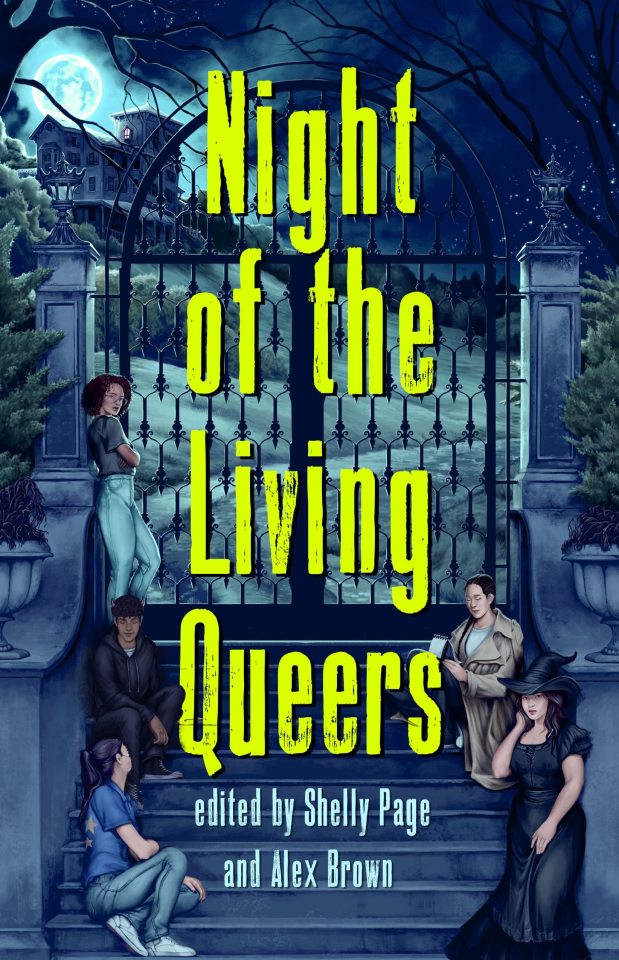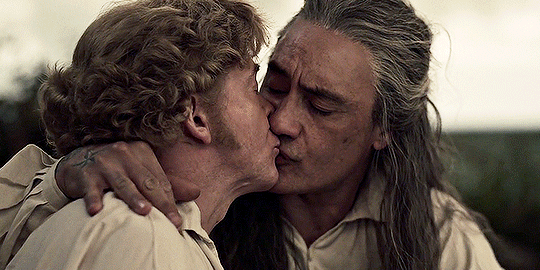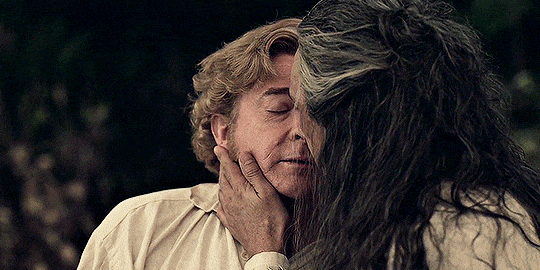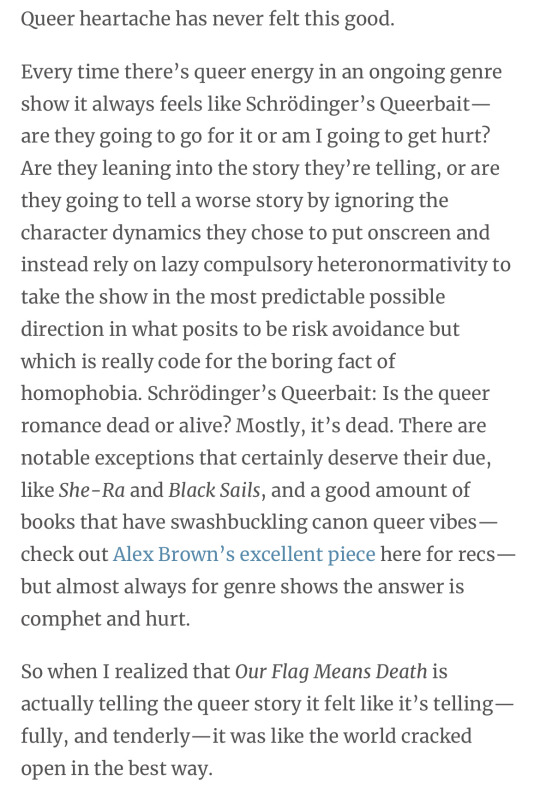#Maya Gittelman
Explore tagged Tumblr posts
Text
Inside an Anthology: Fiery Deeps ed. by J.S. Fields and Heather Tracy
Today on the site, we’re digging inside the brand-new lesbian SFF anthology Fiery Deeps, edited by J.S. Fields and Heather Tracy! Here’s the background: Fire is Power! Quest to the heart of the earth, cross flaming rivers, and brave the fire with our heroes to discover unlimited strength! From fantastic underground cities, to superheroes, to magic of the forge, titanic forces of nature collide in…
#Fiery Deeps#Heather Tracy#J.S. Fields#Maya Gittelman#N.L. Bates#Rosiee Thor#Sara Codair#William C. Tracy
11 notes
·
View notes
Quote
You have so much to look forward to.
Maya Gittelman, from “Leyla Mendoza and the Last House on the Lane”
18 notes
·
View notes
Text
Maya Gittelman's essay is stunning, I recommend it to everyone, and the reblogs are amazing too. I have only one thing to add about queer representation and happy endings.
If we consider the history of audiovisual cultural products, it's only been a very short time that we've had queer representation and queer love (that isn't demeaning, I mean). We needed it when these stories were rare, and we still need it now that they're (a little bit) more common.
The fact is, we've rarely had happy endings.
Think about queer representations from the nineties and early two-thousands: how often did the protagonists end badly? They died violently, from illness, if they were lucky they brokeup, if not one or both didn't make it to the end credits. And we needed this, too. Because we had to see the dangers of queer love, we had to bring to light what had been in the dark, belittled, ridiculed for years. When the system kills you, you need to reveal its horrors.
Now I think we're ready for another cultural phase, one where it's still necessary to show the danger of queer love, but also that there's salvation after the pain. The system is sick, homophobic, for many of us it's still not safe out there. But it's important to know/see on screen/read in books that things can change, are changing, that the battle is worth fighting because the happy ending is possible both collectively and personally. Cultural fabric modifies social fabric, always.
The article says "[Aziraphale] thinks he can make the system into something that loves them both." We've predominantly had stories where the system crushed love because that's what the system does. It was important to see them, and we saw them. Now we need stories where love crushes the system. And I hope Good Omens will be one of these stories.
(Sorry for the possible mistakes, I’m not a native english speaker.)
From Tor.com, an essay. By Maya Gittelman.
#neil gaiman#good omens fandom#good omens#good omens 2#go2#queer love#queer romance#queer community#maya gittelman
3K notes
·
View notes
Text
I really liked this. That's not a very useful comment but that's all there is.
1 note
·
View note
Text
Night of the Living Queers: 13 Tales of Terror Delight by Shelly Page, Alex Brown, Ryan Douglass, Kalynn Bayron, Sara Farizan, Kosoko Jackson, Tara Sim, Rebecca Kim Wells, Trang Thanh Tran, Vanessa Montalban, Em X. Liu, Maya Gittelman, Ayida Shonibar
Publisher: St. Martin’s Press, Wednesday Books Date of publication: August 29th, 2023 Genre: Horror, Young Adult, Short Stories, Anthologies, LGBT, Queer, Fantasy, Paranormal, Fiction, Lesbian Purchase Links: Kindle | B&N | AbeBooks | WorldCat Goodreads Synopsis: Night of the Living Queers is a YA horror anthology that explores a night when anything is possible exclusively featuring queer…

View On WordPress
#Alex Brown#anthologies#Ayida Shonibar#Em X. Liu#fantasy#fiction#Horror#Kalynn Bayron#Kosoko Jackson#lesbian#LGBTQ+#Maya Gittelman#Night of the Living Queers#paranormal#Queer#Rebecca Kim Wells#Ryan Douglass#Sara Farizan#Shelly Page#short stories#Tara Sim#Trang Thanh Tran#Vanessa Montalban#young adult
0 notes
Text
My Favorite Bit: Maya Gittelman talks about WHY ON EARTH
Maya Gittelman is joining us today to talk about their novel, Why on Earth. Here’s the publisher’s description: What starts as a simple rescue mission for a crew of teen aliens to recover one of their own soon becomes an interstellar encounter no one will forget. Captain Iona is organizing an impromptu retrieval for her brother, an undercover alien posing as a movie star. But her efforts go…
12 notes
·
View notes
Text
@actual-changeling you said this so perfectly here. It’s so much about AGENCY. I’ve said for months that taking the offer would destroy Crowley as much as it would destroy their relationship. And on some level Aziraphale’s got to know that. Maya Gittleman said it so beautifully in her brilliant essay (pinned on my blog) that Crowley could not survive trying to stretch on angelskin over his demon self.
The ending revealed a fundamental, seemingly irreconcilable chasm between the two of them. Which makes this not even really a love story, but a tragedy. There’s so much of the queer experience there that makes it hurt so goddamn bad.
And I say this as one who loves the character of Aziraphale, pissy little queen that he is. His petulant, demanding holier-than-thou self who truly loves Crowley, even when he's being a complete jerk to him. But he lives in the shadows, fearful that Heaven will punish him if they ever find out. And Crowley knows this too, which is why HE fears that if it comes down to a choice, that Aziraphale will always choose Heaven over him.
I’m not sure really, but I wonder how many of the Aziraphale stans who say this sort of thing are old enough to remember what it was like when lesbians and gay men had to hide who they were. When being openly queer could get you beaten up or killed. I’ve had bottles chucked at my head for holding my lover’s hand in public, been called “bull dagger” to my face, and god knows what else behind my back. Become something you’re not- or just pretend, because that’s the only way I can feel comfortable being with you. That you’re not enough for me just as you are.
And being out while trying to be in a relationship with someone who wasn't was a literal soul-killing existence. Having to pretend. Playing the "roommate" or the "best friend" at important events like family gatherings, office parties, weddings. And the absolute worst part about it was the fact that they all knew. Those friends, those co-workers, those aunts and uncles and grannies and moms and dads-THEY ALL KNEW. So you stayed underground, out of the light, and it turned out that it didn't really matter.
If you haven't lived that you might not be able to understand how painful it is when someone you think loves you demands that you become something else to be loved in return. You can't give up who you are in order to be what someone else wants you to be (or to seem). That's the opposite of love. No matter how high minded or important the reason for asking it. Crowley loves Aziraphale unconditionally. But the angel has made it clear that reciprocating that love comes at a price (and the price is Crowley's very existence).
People stayed in the closet for a reason. But once we came out, we were NOT going back. Not ever. And it’s much the same for our two heroes. Crowley knows this. Aziraphale’s gonna have to learn.
I don't understand how some people can think Aziraphale doesn't love Crowley. He loves Crowley. He loves him so much that he would rather let him go than settle for even the slightest risk of him being unsafe. He loves him so much that he is putting his own life and existence in danger to keep him protected. He loves him so much that he gives up everything he holds dear, his bookshop, his books, food, his clothes. He loves him so much that everything that makes him happy is reduced to meaningless nothing. He loves him so much that he's giving up his freedom to keep him safe. He loves him so much that he willingly gave himself over to an evil, corrupt, wicked institution that, for all he knows, won't ever let him go again. He loves him so much that he committed one of the worst crimes an angel is capable of, losing faith in God.
He loves him so much that his idea of perfection and infallibility was dismantled. He loves him so much that his entire worldview was changed from the affection and adoration he holds for him. He loves him so much that he openly admitted God had made a mistake and that Heaven was unrighteousness.
He loves him so much that his faith in Crowley is stronger than his faith in God.
#queer love#good omens#ineffable breakup#maya gittelman#I could go on like this but I'll stop here.#I'm old enough to remember what it was like#we are not going back
706 notes
·
View notes
Text
In the first essay in this post Maya Gittelman articulates something that I think is really important: it's not just the gender(fuck) of the characters' coding that makes Good Omens a queer story, it's that the story is about queerness itself.
Gittelman's essay:
The thing is, this is the shit I’ve been waiting for my whole life.
Before I knew the words, I was impacted by how every epic romance, every classic adventure, every story I had access to and enjoyed was cishet. I needed to translate either the story or myself to find myself in it—every single time. I grew up in the oughts, in the days of the Tumblr fandoms you’re thinking of. I wrote about this a bit more in my essay on the first season of Our Flag Means Death last year, and that first line applies here—queer heartache has never felt this good.
I’ve been able to consume a lot of queer storytelling lately—mostly white cis m/m, but not exclusively and more than I’ve ever been able to in my life, because I’ve been searching for it for a long time. Yet as we know, there are a lot of mainstream stories with queer “rep” that at their core about what marginalized queer people have been cautioning around for generations—normalization. Assimilation. Respectability. See, we can be just like you. We too desire to marry, participate as cogs in the violent machine of imperialism. We too want the right to give you our service, our allegiance. We too want to join your armies. I certainly can enjoy plenty of that media, but I’m still desperate for queer storytelling that’s not sanitized, not flattened out to fit cishet beats, something that tells a good story that’s queer on every level. And that means we deserve to see queer characters who are messy, who hurt each other, because sometimes, love isn’t enough.
While Good Omens in some ways still white cis m/m, it’s also not entirely, and what works for me is that it actually delves into asking the damned question: What if this love is a threat, actually?
What if this love is something that does disrupt your norms, your ways of life? What if it’s an open danger to the systems you’re used to? What if this love could disrupt everything? What if it goes against God’s will and Satan’s too, what if it flies in the face of the ineffable plan?
What I’m saying is, I’ve wanted stories that let queer people be characters, with all the nuance and complexity that entails. Stories that are queer, intentionally, in both subtext and text, that aren’t asking an audience to justify their right to exist. Instead, they’re giving voice to the specifics of queer experience that don’t typically get mainstream care, multi-season tenderness. We deserve queer love stories that are wistful, epic, tragic not because they’re of the “same gender” but because the tangled truths of safety and trauma are inextricable from queer love. We deserve stories that are queer as subtext and text, metaphor and central plot and side plot too. We deserve queer stories that explore how queer love is infinite variety. We deserve genre stories that explore what immortality or something close to it does to pining, to longing, for wanting the one person in the universe you can’t have.
We deserve queer stories without homophobia that still explore the traumas of marginalized desire, in which neither party is truly the villain, just victims of the same system, at different stages of knowing it.
Show me what it looks like beyond the happily ever after, the will they/won’t they, the beats of a privileged cis white coming out. Breathe arcs of nuance and poetry and history into it. We deserve that epic romance, and we deserve to see how much it can hurt, because the depths of that wound evidence the ferocity of that love.
Growing up queer can feel monstrous, and I need to see that on screen. When you get preached at that people like you go to Hell for what you are and the ways you want, you start to relate to the demons. When you’re taught the truest, most joyful parts of you are unholy, it’s fair to ask—why should I respect the authority of a system that hates me for reasons I can’t control?
You learn to disguise your desire, and it changes you. It changes you to choke down your feelings, to deny them, to believe that they are sin. You learn to pour them into the hidden language of love that arises between you and whoever you’re lucky enough to share it with, so you don’t learn how to say them aloud. (Their arrangement, “little demonic miracle of my own,” the fourth alternative rendezvous. This is what queer love has looked like for millennia: something beautiful and true, despite, despite, despite.) Unlike those whose love has only ever been legal, permitted, “normal,” “holy”—your relationship is inescapably shaped by the threat behind it. You don’t get to see them as often as you like. You don’t get to talk, either to them or about them, because it might disturb the precious existence you have carved out together. You have to make up excuses, you can’t admit to anyone exactly why you can’t stop going back, and in this way you don’t always have to confront it yourself.
At the same time, that’s why queer love can be one of the most powerful forces in the universe—it saved the world last time, even if they didn’t call it that, yet. Aziraphale and Crowley don’t know so many details about each other’s lives and yet they know nearly everything important.
This is love—this natural state of slipping into the truth, until you awaken to it, inevitable and encompassing, all around you.
You might find yourself almost helpless to the magnetism. You can’t stop going back, finding your way to them, taking the risk, basking in the thrill of the comfort of their company.
And that’s why this finale, this story, this couple works so well for me—it’s queer in the telling, and while it always has been, this season literalized it on a new level and that matters.
#good omens#good omens meta#good omens as a queer story about queerness#christianity#ineffable husbands#the christian world is a dystopian horror#christianity is authoritarianism from the spirit outwards
19 notes
·
View notes
Text

The ebook for Lofty Mountains is on sale this week for just $.99! Grab this anthology full of sapphic tales of cloudy peaks, air ships, and giant bees! On sale until February 17th!
My story, Don't Look Down, is about a mountain dwarf with seasonal affective disorder whose world brightens a little when a harpy falls into her pumpkin patch and she must nurse her back to health! It's romantic and cozy and I hope you like it!
The anthology also includes stories by Seanan McGuire, J.S. Fields, Rebecca Kim Wells, Maya Gittelman, William C. Tracy, and more!
5 notes
·
View notes
Photo

Rating:4.5/5
Book Blurb: Night of the Living Queers is a YA horror anthology that explores a night when anything is possible exclusively featuring queer authors of color putting fresh spins on classic horror tropes and tales. No matter its name or occasion, Halloween is more than a Hallmark holiday, it’s a symbol of transformation. NIGHT OF THE LIVING QUEERS is a YA horror anthology that explores how Halloween can be more than just candies and frights, but a night where anything is possible. Each short story will be told through the lens of a different BIPOC teen and the Halloween night that changes their lives forever. Creative, creepy, and queer, this collection will bring fresh terror, heart, and humor to young adult literature. Contributors include editors Alex Brown and Shelly Page, Kalynn Bayron, Ryan Douglass, Sara Farizan, Maya Gittelman, Kosoko Jackson, Em Liu, Vanessa Montalban, Ayida Shonibar, Tara Sim, Trang Thanh Tran, and Rebecca Kim Wells.
Review:
A collection of horror stories all happening on Halloween, told from different BIPOC teens. All the stories range from creepy to fun stories that take a fresh spin on classic horror tropes and tales. I had an absolute blast reading this one. I love that we get to read just a whole collection of queer horror stories that range from summon demons to inviting vampires in and dealing with feelings for your crush... who just might be a creature from another world. What a lovely and fun read that I would definitely recommend!
*Thanks Netgalley and St. Martin's Press, Wednesday Books for sending me an arc in exchange for an honest review*
3 notes
·
View notes
Text
Inside an Anthology: Why on Earth ed. by Rosiee Thor and Vania Stoyanova
Today on the site we’re headed inside Why On Earth, a YA sci-fi anthology edited by Vania Stoyanova and Rosiee Thor that just released from Page Street on Tuesday! Here’s the story: What starts as a simple rescue mission for a crew of teen aliens to recover one of their own soon becomes an interstellar encounter no one will forget. Captain Iona is organizing an impromptu retrieval for her…
#Anthology#M.K. England#Maya Gittelman#Rebecca Kim Wells#Rosiee Thor#Sci-Fi#SJ Whitby#Vania Stoyanova#Why On Earth
6 notes
·
View notes
Text
40/100 #The100DayProject

"Queer as in fuck you, trans as in fuck this." Maya Gittelman
#The100DayProject#100DayProjectByNinsiana0#ArtByNinsiana0#doodle#doodles#drawing#drawings#sketch#sketches#sketchbook#illustration#illustrations#portrait#portraits#portraitdrawing#art#artist#artists of tumblr#artists on tumblr#I made this#sharpie#sharpie art#picmonkey
1 note
·
View note
Text
The entire story is one of deliberate compassion, it’s the very fabric of the show. From Lucius supporting Stede and Ed through their rougher patches to his healthy “we don’t own each other” relationship with Black Pete. Olu taking every opportunity to be thoughtful and gentle with Jim, his offering of “if you want…I could be family,” that’s the core of it—the very queer structure of a chosen family. Stede couldn’t be himself in a cishet family. He made room for honest emotions aboard The Revenge, and it didn’t take long for the rest of the crew to find belonging on that ship. Their dynamic is tender, and legibly queer—a challenge to the machismo and toxic masculinity of the rest of pirate culture, as well as an open critique of cishet white colonizer masculinity. Not only does the entire structure of The Revenge exemplify masculinities that make no space for toxic cruelty—including trans, gender non-conforming, body diverse masculinity—it renders that sort of behavior absurd and out of place. The show emphasizes that while Stede’s efforts are clumsy, the environment of kindness and support he creates is effectual, because it feels so much better than the self-punishment most pirates swear by.
Maya Gittelman in Act of Grace: Masculinity, Monstrosity, and Queer Catharsis in Our Flag Means Death
#our flag means death#ofmd#stede bonnet#lucius spriggs#oluwande boodhari#black pete#maya gittelman#m
184 notes
·
View notes
Text
Okay this by Maya Gittelman made me cry? In a good way. Like the show did. OFMD is such a gift. I want to quote the whole damn thing it's so good but they deserve the clicks for it! A few bits with alt text...




10 notes
·
View notes
Text
This article is brilliant, and absolutely full of analysis gems:
The entire story is one of deliberate compassion, it’s the very fabric of the show. From Lucius supporting Stede and Ed through their rougher patches to his healthy “we don’t own each other” relationship with Black Pete. Olu taking every opportunity to be thoughtful and gentle with Jim, his offering of “if you want…I could be family,” that’s the core of it—the very queer structure of a chosen family. Stede couldn’t be himself in a cishet family. He made room for honest emotions aboard The Revenge, and it didn’t take long for the rest of the crew to find belonging on that ship. Their dynamic is tender, and legibly queer—a challenge to the machismo and toxic masculinity of the rest of pirate culture, as well as an open critique of cishet white colonizer masculinity. Not only does the entire structure of The Revenge exemplify masculinities that make no space for toxic cruelty—including trans, gender non-conforming, body diverse masculinity—it renders that sort of behavior absurd and out of place. The show emphasizes that while Stede’s efforts are clumsy, the environment of kindness and support he creates is effectual, because it feels so much better than the self-punishment most pirates swear by.
Please click the link above and read the whole thing. It's long but it's beautiful. And it expresses extremely well the sentiment "wow does it feel good to be seen".









It’s a marvelous thing, to actually get to bask in the unfolding of a story like this. It’s queerness, for queers… The show itself actually feels like a queer space: we know we’re safe in it, our desire is safe in it, and all the jokes are for us, not at our expense. When queerness is publicly under threat and the pandemic has taken away so many opportunities for community—this show feels like a gift.
from this gorgeous tribute to our flag means death
#queer experience#meta#stede bonnet#edward teach#kissing#gifset#season 2 confirmed#queerbaiting#Maya Gittelman#article
3K notes
·
View notes
Quote
Not only does the entire structure of The Revenge exemplify masculinities that make no space for toxic cruelty—including trans, gender non-conforming, body diverse masculinity—it renders that sort of behavior absurd and out of place. The show emphasizes that while Stede’s efforts are clumsy, the environment of kindness and support he creates is effectual, because it feels so much better than the self-punishment most pirates swear by.
Maya Gittelman, “Act of Grace: Masculinity, Monstrosity, and Queer Catharsis in Our Flag Means Death”
36 notes
·
View notes